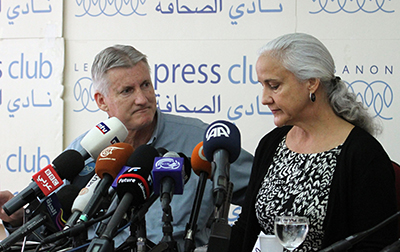It has now been an entire year since Al-Hurra correspondent Bashar Fahmi, a Jordanian of Palestinian origin, and freelancer Austin Tice, of the United States, went missing in Syria. But the recent liberation of two freelance journalists held for months gives us some reason to hope.
Fahmi disappeared during a firefight in Aleppo on August 20, 2012, along with Turkish cameraman Cüneyt Ünal. The same day, Japanese journalist Mika Yamamoto was killed in Aleppo. Ünal was released by the Syrian government in November 2012, but there has still been no word on Fahmi’s fate.
“It is unimaginable that one year later we are still at a loss for information regarding the whereabouts or well-being of Bashar,” said Michael Meehan, chairman of the board that oversees the Middle East Broadcasting Networks, Inc. (MBN), in a statement this month. MBN manages Al-Hurra and its sister station, Radio Sawa.
The U.S. government has indicated Tice is in Syrian custody, but the family says it is still uncertain who abducted him.
On August 14, the Tice family released a statement commemorating the 365 days since they last heard from Austin. “None of us want to place special significance on this date because we know that every one of those days has been unimaginably challenging for Austin,” the family wrote. “The most tolerable aspect of this day is that it means we are one day closer to the return of Austin, of all other captives, and relief of the suffering of the Syrian people.”
Journalists have faced ever increasing threats in Syria in the year since Fahmi and Tice disappeared. CPJ has reported at least 32 local and international journalists have been killed for their work and at least 24 have been abducted in the past 12 months. Freelancer James Foley, an American, has now been missing for nine months.
But two abductees have recently got out. Freelance journalists Jonathan Alpeyrie, a French-American, and Matthew Schrier, an American, returned home safely after months of detention in rebel hands.
Alpeyrie, likely betrayed by his fixer, was abducted by rebel forces in the Damascus countryside on April 29. In interviews with Paris Match and Le Journal de la Photographie, Alpeyrie describes 81 harrowing days of physical and psychological torture in rebel custody before a benefactor paid a hefty ransom for his freedom.
Schrier endured a longer captivity–seven months–by two Islamist rebel groups who accused of him of being a spy, The New York Times reported last week. The abductors, mostly from the Nusra Front, which is aligned with Al-Qaeda, beat him and stole his online identity, emptying his bank account and corresponding with his friends and family. He managed to escape on July 29 by squeezing through a basement window and seeking help on the streets of Aleppo. Another unidentified American with Schrier was unable to get through the opening.
Alpeyrie and Schrier were abducted in completely different parts of Syria by rebels with apparently divergent motives. Alpeyrie’s freedom was bought. Schrier crawled out a window for his.
Yet they are alike in two important ways.
They both illustrate the immense abduction risk journalists face while working in Syria, but they also are a source of hope for the families of Bashar Fahmi, Austin Tice, James Foley, and all the other missing journalists in Syria. If, after months of captivity, both Alpeyrie and Schrier can return home safely, perhaps the others can return home to their loved ones as well.
Earlier this month, the Rory Peck Trust, a group dedicated to the safety of freelancers, released a statement urging journalists to reconsider going to Syria, explaining: “This is a new situation where no amount of planning or preparation can reliably reduce the possibility of kidnapping or abduction.” Several journalists have told CPJ they are heeding such warnings.
